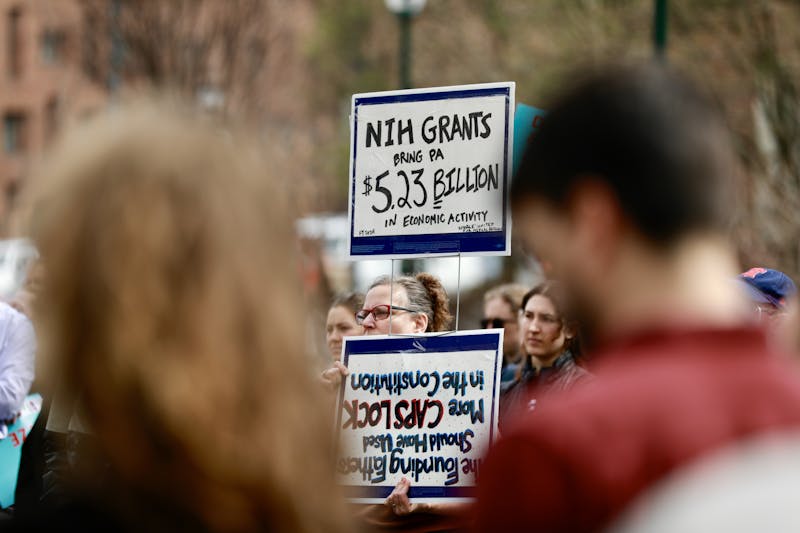From Andrew Exum's, "Perilous Orthodoxy," Fall '00 From Andrew Exum's, "Perilous Orthodoxy," Fall '00As I opened The Daily Pennsylvanian to this very page on the last day of the fall term, I noticed a letter to the editor admonishing students to abstain from cheating and complete their upcoming exams honestly and without any outside help. Tanenbaum, it turns out, is co-chair of the University Honor Council. Your University Honor Council. And much to Tanenbaum's credit, she's quite devoted to making Penn a more honor-bound place. Talking with her over winter break, I found her to be someone passionate about and dedicated to promoting and enforcing the University's system. But there's a problem when a soon-to-be-graduated senior sees Tanenbaum's name and has no earthly idea who she is. Honor at Penn should not be encapsulated into a once-a-semester letter to the campus -- it should be a constant, over-arching theme of the University. Seldom anymore do we hear any talk of honor, integrity and fairness on campus. And that's a shame, because it doesn't have to be that way. At the University of Virginia, for example, all incoming freshmen receive a video and booklet on the school's honor system the summer before they matriculate. They take their code -- among the oldest in the country -- seriously and expect others to do so as well. The honor committee at Virginia is a huge organization supported by hundreds of volunteers. If you are caught maliciously cheating, the honor committee -- composed entirely of students -- is empowered to throw you out of school. Period. The honor system at Virginia didn't come from the school's administration, however. It arose way back in 1842 from the students themselves, who understandably desired to learn and study in an environment in which all were held accountable for not only the quality of their work, but its integrity as well. Students at other universities across the country are governed by similarly high-profile, student-led honor codes and systems. One Penn professor I talked to last semester recounted his surprise upon seeing how prominent the honor code was at Princeton when he served there as a visiting faculty member. Here at Penn, students rarely even take the time at the end of an exam to sign the honor code printed at the back of their blue books. Thankfully, administrators, faculty and students have begun taking steps to promote the honor system at Penn. Deputy Provost Peter Conn leads a task force charged with recommending "new or revised ways to emphasize academic integrity at Penn." The Task Force on Academic Integrity -- created at Tanenbaum's urging -- pledges to, among other things, "develop approaches that could present academic integrity in a positive light" and "outline concrete measures to combat dishonesty." While I have full faith in the student leaders, faculty and administrators on the task force, here are some places they can start: · Give the University Honor Council some teeth. Let it not only rule on cases that come before them, but also allow it to investigate suspected cases of academic dishonesty and give it the resources to do so. Currently, members of the Honor Council constitute a minority on joint faculty-student academic integrity hearing panels. Academic integrity cases, however, should be completely student-driven. Let those who violate the honor code answer to their peers. · That said, make the elections to the University Honor Council a big deal -- and public. The chairman of the University Honor Council, in my opinion, should be on par with the UA chair in importance. This is, after all, the person we are entrusting to guard the integrity of the undergraduate schools. In addition, the other members of the Honor Council should be similarly elected, in much the way that we elect UA members in open elections as both representatives of classes and of schools. · Do as the University of Virginia does and send out instruction to the incoming freshmen on the University's honor code before they step foot onto the campus grounds. We did it last year with the Alcohol 101 CD-ROM to educate incoming freshmen on responsible alcohol use, so there's no reason we can't do the same thing with a video on honor at Penn. My guess is, if you do that on an annual basis, Penn will be filled by the year 2004 with undergraduate students who look at the University's Honor Council and the honor code in a much different way than students today do. And that's what it's really all about. Taking steps today to strengthen the honor system is an investment in the future of the school. It would be nice to sit down for an exam and know, without question, that you're being compared with the students beside you on how well you study and learn -- not how well you cheat.
The Daily Pennsylvanian is an independent, student-run newspaper. Please consider making a donation to support the coverage that shapes the University. Your generosity ensures a future of strong journalism at Penn.
DonatePlease note All comments are eligible for publication in The Daily Pennsylvanian.







